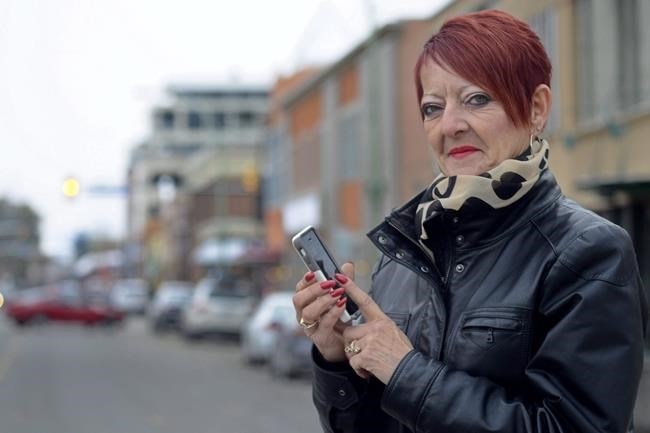
Angie Lohr, President of Hope Outreach is seen in Kelowna, B.C., on Saturday, Nov. 4, 2017. An outreach group supporting vulnerable women in British Columbia is hoping a cellphone app designed to monitor remote workers in resource industries will help keep sex workers safe.
Image Credit: THE CANADIAN PRESS/Desmond Murray
November 20, 2022 - 9:22 AM
Following the disconnect during the height of the COVID-19 pandemic, a non-profit organization that supports marginalized women is hoping to reconnect them with resources and services using an app.
Angie Lohr is the executive director of HOPE Outreach. Since 2008, H.O.P.E. Outreach has encouraged women to report their experiences through a “Bad Date Report” to deter and decrease violence against women. Once filed, these alerts are sent to various agencies across the Okanagan.
During the pandemic as more people were isolated and there was a lack of support services, they saw an increase in women going into sex work, Lohr said.
These women may be homeless and trading these services for a warm place to stay for a night, she said.
“Women are trying to pay their rent and trying to put food on the table,” she said, adding domestic violence against women has also increased.
“Because of COVID, everyone was so isolated that it’s not like they’ve lost touch but they’ve lost touch with the services available to even know this bad date reporting goes on, so we’re almost starting at square one to protect women."
In the next few weeks, with a new program, they hope to launch a new safety app and will pass out cell phones and paid-for minutes to marginalized women that don’t have digital connections. The app has been in the works since 2017.
“It will have resources and a button to look up where to find shelters or showers and food. They will be able to report bad dates right on the app,” she said. “We’re just trying to get these women connected to counselling or support.”
It will also have an emergency button to connect women with their friends or emergency services.
They’re hoping it will be available on iPhones and on the Google Play store.
“Probably more bad dates are happening than ever but with the disconnect with COVID and services, and new women since the ones we’ve served two years ago, we’re having to re-educate everybody on bad date reporting,” Lohr said.
They receive on average about two to three bad date reports a month.
“Now we’ve had a lot of women going online for sex work, before we used to find them literally standing on the street, so we’ve not been able to reach a lot of ladies that have gone into sex work,” she said.
A three-year project is also going ahead called the British Columbia Bad Date Agressor Alert Project to create a provincial-wide bad date reporting system in the next few years.
“We’ve all been doing our own little thing in the community but not everyone sees it,” Lohr said.
To contact a reporter for this story, email Carli Berry or call 250-864-7494 or email the editor. You can also submit photos, videos or news tips to the newsroom and be entered to win a monthly prize draw.
We welcome your comments and opinions on our stories but play nice. We won't censor or delete comments unless they contain off-topic statements or links, unnecessary vulgarity, false facts, spam or obviously fake profiles. If you have any concerns about what you see in comments, email the editor in the link above.
News from © iNFOnews, 2022